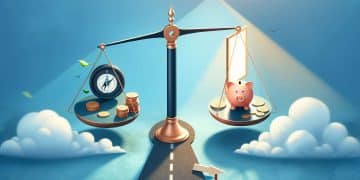Master Personal Budgeting: Unlock Financial Freedom & Stress-Free Living


Mastering Personal Budgeting: A Guide to Financial Freedom
In our modern, rapidly changing world, financial stability is a primary concern for many individuals. Personal budgeting is no longer just a beneficial practice but a vital necessity for maintaining financial health. By mastering the art of budgeting, you can live within your means, effectively save for future aspirations, and dramatically reduce financial stress. This article will delve into the essentials of personal budgeting, providing practical guidance and highlighting common mistakes to avoid.
Anúncios
Understanding why budgeting matters is the first step in taking control of your finances. A well-structured budget offers a clear view of your financial health, helping you manage your money wisely. It serves as a guide, directing you toward financial goals, such as purchasing a home, supporting a child’s education, or planning a comfortable retirement. Without a budget, you may lose track of spending, risk accumulating debt, and jeopardize your financial security.
To truly succeed in personal budgeting, it’s crucial to understand its core components. Personal budgeting involves creating a detailed plan to manage income, expenses, and savings. This process includes tracking earnings and expenditures, ensuring spending remains within reasonable limits, and setting aside funds for future obligations. A well-crafted budget is not merely about constraints but about enabling financial freedom through mindfulness and strategic financial planning.
Crafting an Effective Personal Budget
Creating a personal budget involves several essential steps, requiring both thoughtful consideration and discipline. The process begins with calculating total monthly income, which includes sources such as salary, freelance work, or investment returns. This foundational step is crucial for understanding available resources and setting realistic expectations.
The next step in crafting your budget is to list all monthly expenses. Categorize these into fixed expenses like rent and loan repayments and variable ones like dining out and entertainment. This categorization is vital as it allows you to identify areas where costs can be cut if necessary, providing flexibility in the financial plan.
Once expenses are detailed, compare them against your income. Subtract the total expenses from your income to determine your financial standing. A positive outcome indicates a surplus, allowing for additional savings or investments, while a negative result signals the need for budget adjustments to curb overspending.
Allocating funds to savings and debt repayment is a critical step in personal budget management. Prioritize saving a portion of any surplus for an emergency fund and other specific financial goals. Similarly, allocate funds to pay down existing debts, prioritizing high-interest obligations to accelerate financial freedom.
Sticking to a budget can be challenging, but leveraging available tools can facilitate adherence. Budgeting apps like Mint or YNAB automate expense tracking and offer reminders for bill payments, helping to maintain financial discipline. Regularly reviewing and adjusting your budget is crucial, as financial situations and goals can evolve over time.
Characteristics of Personal Budgeting
- Involves comprehensive planning and tracking of income and expenses.
- Requires categorization of expenses into fixed and variable types.
- Demands setting specific, measurable, and realistic financial goals.
- Incorporates debt repayment and savings as priorities.
- Encourages regular review and adjustments as financial circumstances change.
Benefits of Mastering Personal Budgeting
Mastering personal budgeting has numerous advantages that enhance your financial well-being and overall quality of life. One of the primary benefits is the significant reduction in financial stress. Knowing exactly where your money is being allocated offers peace of mind, preventing unexpected shortfalls and alleviating anxiety related to finances.
Additionally, personal budgeting promotes better financial decision-making. By thoroughly understanding spending habits and financial patterns, you can make informed choices, cutting unnecessary expenses and directing funds toward meaningful goals. This insight leads to a more purposeful management of your finances.
The achievement of financial goals becomes more attainable with a detailed budget. By consistently tracking progress, you remain motivated and committed to reaching milestones, as the transparency of success can be a powerful motivator. A visible progression helps maintain focus on broader objectives like retirement or significant investments.
Personal budgeting fosters a sense of empowerment and control over your financial destiny. It transforms financial management from a reactive to a proactive approach, encouraging accountability and strategic thinking. Through regular assessments and purposeful action, you can shape a financially secure future.
Understanding the importance and the ability to adjust for irregular expenses is another benefit. Planning for unexpected costs, such as car maintenance or unforeseen medical bills, ensures that your budget remains intact, avoiding disruptions to your financial plan.
- Reduced financial stress and peace of mind.
- Improved financial decision-making and allocation of funds.
- Better tracking and achievement of financial goals.
- Empowerment and control over financial planning.
- Preparedness for irregular expenses and emergencies.





